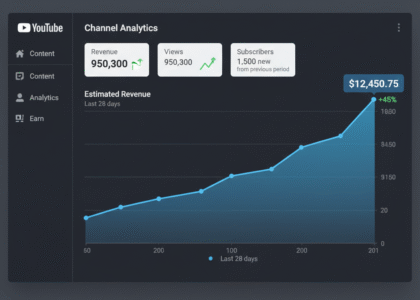In today’s fast-paced financial landscape, choosing the best credit card is more important than ever. Whether you’re a young adult just starting out, a freelancer balancing multiple income streams, or someone looking to improve their credit, the right credit card can make a significant difference. But with so many options available, how do you decide which one suits your unique needs?
In this guide, we’ll explore the factors you should consider when selecting the best credit card, break down the various types of credit cards, and provide actionable tips to help you make an informed choice.
Why Choosing the Best Credit Card Matters
Credit cards aren’t just a way to pay for things—they’re powerful tools that can either support or hinder your financial goals. By selecting the right card, you can:
- Build or improve your credit score
- Earn valuable rewards and cashback
- Enjoy interest-free grace periods
- Access perks like travel insurance, fraud protection, and concierge services
However, making the wrong choice can lead to high-interest debt, unnecessary fees, and missed opportunities. Understanding your financial habits and needs is essential for choosing a card that maximizes benefits while minimizing costs.
Step 1: Assess Your Financial Needs and Goals

Before diving into credit card options, it’s essential to assess your personal financial situation. Your choice should align with your current financial needs and future goals.
Questions to Ask Yourself:
- Are you carrying a balance from month to month, or do you typically pay your balance off in full?
- Do you want to earn rewards (such as travel miles or cashback) with your spending?
- Are you trying to build or improve your credit score?
- Do you travel frequently and want to take advantage of travel benefits?
For example:
If you’re looking to build credit, you may want a card with no annual fee and a low-interest rate. On the other hand, if you pay off your balance each month, you might prioritize cards with great rewards like cashback or travel points.
Step 2: Understand the Types of Best Credit card

Not all credit cards are created equal. To find the best credit card for your needs, it’s important to understand the different types of cards available:
1. Cashback Credit Cards
These cards reward you with a percentage of cashback on your purchases. Some offer flat-rate cashback on all purchases, while others offer higher cashback in specific categories (e.g., groceries, dining, gas).
Example:
If you’re a frequent grocery shopper, a cashback card with 3% on groceries could help you save a lot.
2. Rewards Credit Cards
Rewards cards allow you to earn points or miles that can be redeemed for travel, gift cards, or merchandise. This is ideal if you travel often or want to accumulate rewards for future use.
Example:
Travel rewards cards often come with additional benefits like free checked bags, priority boarding, and access to airport lounges.
3. Balance Transfer Credit Cards
If you’re carrying high-interest credit card debt, a balance transfer card may be the best option. These cards offer low or 0% introductory APR on balance transfers for a limited time, allowing you to pay down debt without accumulating interest.
4. Secured Credit Cards
Secured cards require a deposit, which serves as collateral in case you default. These cards are great for those looking to build or rebuild their credit score.
5. Student Credit Cards
Designed for young adults who are new to credit, student credit cards often come with lower credit limits and fewer perks but offer a solid foundation for building credit.
Step 3: Compare Interest Rates and Fees: Best Credit card

Interest Rates (APR)
Interest rates vary widely from card to card, and they can significantly impact how much you pay in interest if you carry a balance. It’s crucial to compare APRs for purchases, cash advances, and balance transfers before selecting a card.
Annual Fees
Many rewards cards come with annual fees. Make sure the rewards you earn outweigh the fee costs. If you don’t plan to use the rewards or benefits, a no-annual-fee card might be more cost-effective.
Other Fees to Watch Out For:
- Late payment fees
- Foreign transaction fees
- Cash advance fees
Step 4: Consider Credit Limits and Credit Score Requirements: Best Credit card
Some credit cards have higher credit limits than others. If you need more flexibility in your spending or want to keep your credit utilization low, it’s worth considering cards with higher limits.
Additionally, be aware of the credit score requirements for each card. Many premium cards require excellent credit, while others are more forgiving for individuals with average or even poor credit scores.
Step 5: Read the Fine Print: Best Credit card
Before applying for a credit card, always read the terms and conditions carefully. Look out for any hidden fees or restrictions, such as foreign transaction fees or limits on rewards redemption. Understanding the fine print will help you avoid surprises down the line.
Actionable Tips for Maximizing Your Credit Card Benefits
- Pay on Time: Avoid late fees and interest by paying your bill on time every month.
- Use Your Rewards: If you have a cashback or rewards card, make sure you’re using it strategically to maximize the benefits. For example, use a cashback card for everyday purchases and a travel rewards card for big-ticket items like flights and hotel stays.
- Keep Your Credit Utilization Low: Try not to use more than 30% of your available credit to keep your credit score healthy.
FAQs
1. How do I know if I’m eligible for the best credit card?
Eligibility usually depends on your credit score and income. You can check your credit score for free to determine which cards you may qualify for.
2. What’s the difference between cashback and rewards cards?
Cashback cards give you a percentage of your spending back in cash, while rewards cards earn points or miles that can be redeemed for travel, merchandise, or other perks.
3. Can I switch credit cards?
Yes, you can switch cards at any time. Just make sure to pay off any remaining balance on your old card before transferring to a new one.
Conclusion
Choosing the best credit card for your financial needs involves assessing your spending habits, financial goals, and lifestyle. By understanding the different types of credit cards available and comparing the features, interest rates, and fees, you can find a card that offers the most value for your situation.
Whether you’re aiming to build credit, earn rewards, or manage debt more effectively, the right credit card can be a game-changer. Start by evaluating your needs, and use our tips to make an informed decision that helps you manage your finances and reach your goals.
Ready to make smarter financial moves? Discover more expert tips on budgeting, investing, and growing your portfolio at GetCashVibe today!






